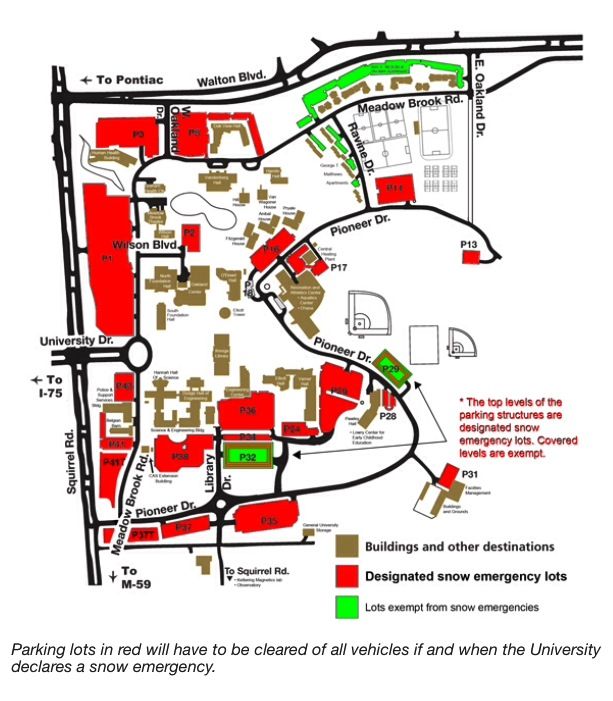Toe the line or be towed: OUPD cracks down on snow emergency parking policy
During a snow emergency, the lots marked in red must be cleared of cars between 10 p.m. and 6 a.m. Those failing to comply will face impoundment.
Coming this winter, Oakland University students can look forward to clear parking lots and potentially clear checkbooks if they fail to park in designated lots during snow emergencies.
Effective immediately, the Oakland University Police Department will be impounding and towing cars in any campus parking lot other than P29, P32 and the Anne V. Nicholson and George T. Matthews apartment parking spaces during declared emergencies, or when any snowfall of three or more inches is in the forecast. All other lots must be clear between the hours of 10 p.m. on the day the emergency is declared and 6 a.m. the next morning.
The price of failing to comply? According to Chief of Police Mark Gordon, the retrieval of the impounded cars will cost offenders an initial $100, along with potential storage fees of $20 per day at Byers Wrecker Service on 399 South St. in Rochester.
The policy, sent to OU students Friday, November 21, includes the closure of the designated overnight parking spots in areas such as P1, P3, P5 and the roof of the P29 parking structure. This means any students utilizing Kresge Library, the university laboratories, or on campus for any student organization or event past 10 p.m. on a day when a snow emergency is declared should move their cars or prepare to pay at the pound.
“It’s a necessary evil,” said Director of Housing Jim Zentmeyer, “but the lesser of evils.”
The greater “evil,” Zentmeyer said, was last year’s scenario.
“We tried the voluntary route,” he said. “For example, we’d email and ask students to clear P5 on a specific night, but they refused to move. People were slipping and falling on the ice [of the lots unable to be plowed due to parked cars] and we want to reduce those injuries where we can.”
“It’s ultimately necessary to ensure campus safety,” said Oakland University Student Congress Student Services Director Kyler Johnson. “Nobody listened last year when they tried to be nice, so now they have to go about it differently.”
“I think if people use the campus resources put in place for the situation, there should be no headaches,” he added.
Gordon said that OUPD “will do its best to declare emergencies by 5 p.m.”
“We’re not here to impound anyone unnecessarily,” he said. “It’s for the safety of the community.”
Partnering with university communication staff, OUPD will courier the alert through text and phone messages to registered users, university email accounts, the OU webpage and various social media sites.
“We’ll definitely be canvassing the residence halls and apartments to let students know the policy is out there,” said Zentmeyer. “The residence association staff will also be informing residents when there is a snow emergency.”
Gordon emphasized that the Bear Buses will be working during emergencies to take students to the designated parking areas, and said that despite the reduced overnight parking spaces in the event of three inches of snow, “Oakland University has made the calculations to assure that those in need of overnight parking will be able to use it.”
“If you’re in a residence hall or athletics or just leaving your car at OU for the weekend, I recommend you park in the parking structure during the winter so you can be sure to avoid being towed,” he added.
“It would be wonderful if we didn’t have to use this at all, but we live in Michigan,” said Zentmeyer. “This is new for us, too, but we believe we’ve thought out all the possibilities and this is the best option.”
To register for Oakland University text message alerts, visit www.oakland.edu/uts/emergencynotification.
In the event of a snow emergency, The Post will also alert students via Facebook and Twitter updates.













